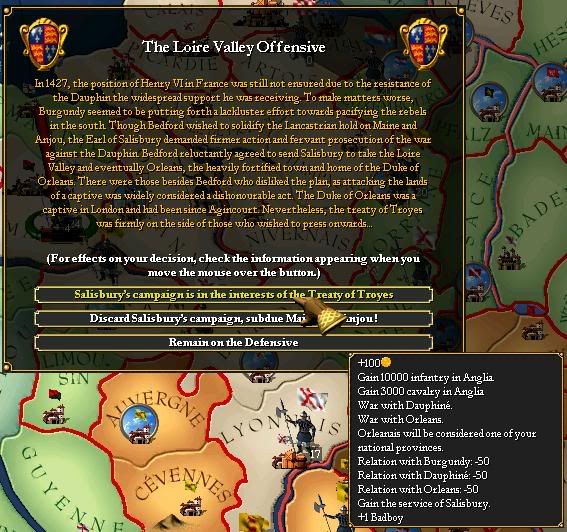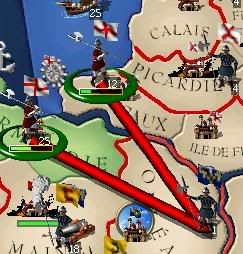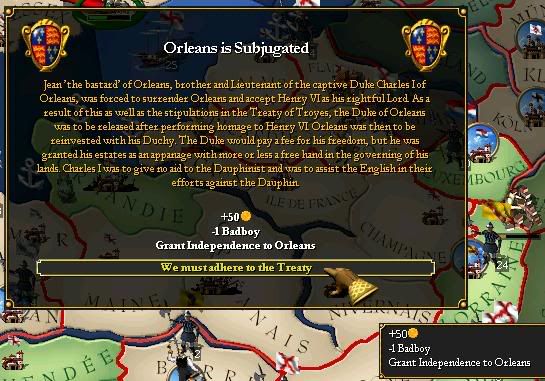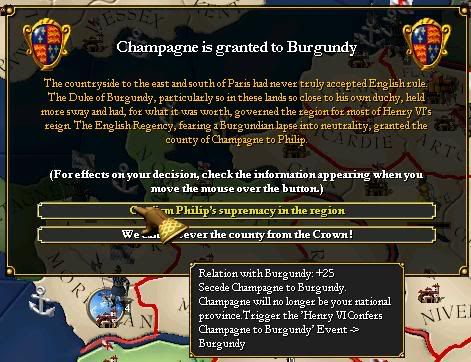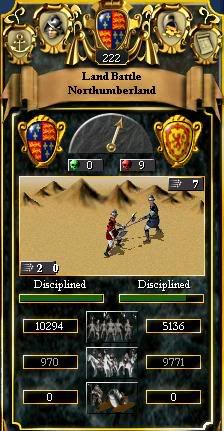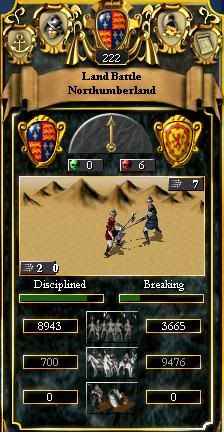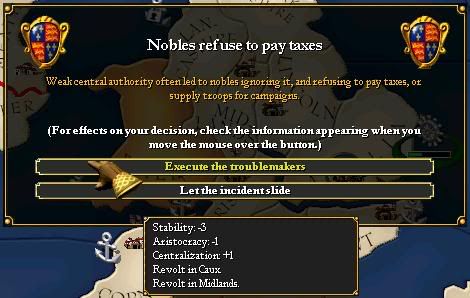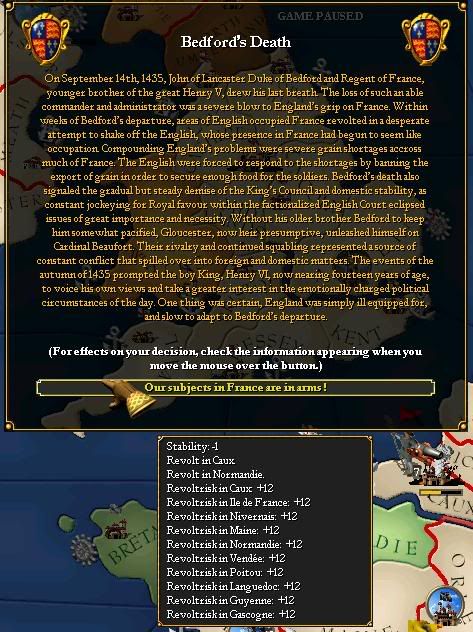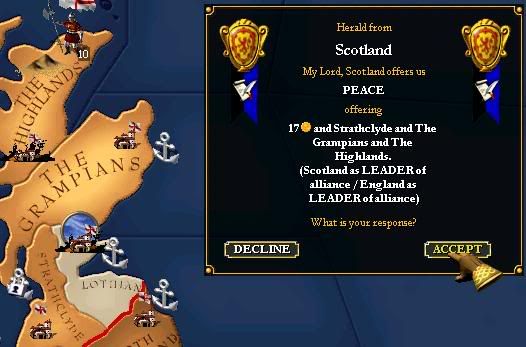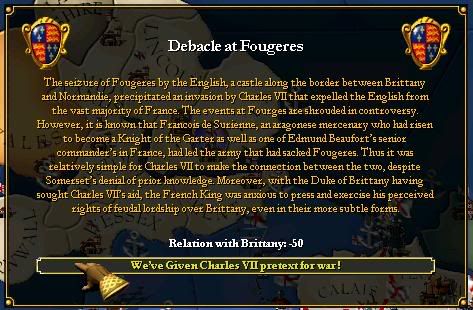In the Footsteps of Magna Charta - Chapter XIII
Dauphiné province of Berri
March, Year of our Lord Fourteen Twenty-six
Dauphiné province of Berri
May, Year of our Lord Fourteen Twenty-six
They rode down the road in a set pace. They were not in a hurry, but they were not lagging behind either. The sun stood high in the blue spring sky and the scarce trees around them were just about to blossom. Having ridden for days, their brown capes had turned grey from relentless dust that marked their way for miles in the dry ground. There were four of them. For their whole journey, they had been trying to ride invisibly through the French scenery, all the way from Lorraine through the hostile territory of Burgundy. It was not until now they were safe, having crossed the Dauphin’s border several hours ago. Continuing their ride to the west, they reached the Dauphin’s palace within nightfall. As one figure made itself across the palace grounds to the stairways, the other three halted by the stables instead, taking care of their horses.
She headed upstairs, through the labyrinth of corridors that headed to the Dauphin’s reception chambers. She had never been there, yet she knew exactly how she was going to find the right room. They had told her. They had told her everything. The English plans for attacking, the betrayal of the Burgundese, and the fall of English France. They had given her a Godly sword. That and the robes she now wore were the only possessions she owned, except for her clothes.
She reached the door she had seen in her dreams. Her hand moved as if she did not control it, slowly opening it. She had expected to be received alone, just the Dauphin and her, with a few aides. This scene that was playing out in front of her was none of that.
The whole court was gathered, roaming around. People everywhere, not empty as she had foreseen. It made her nervous, her stomach acting up strangely. Forward, a voice told her. She did not know where it came from, or how it entered her mind. All she knew was that it had helped her numerous times before and had never lied to her. She strode inside the room, trying to search for the Dauphin. Suddenly a man stood in front of her.
Chapter XIII
The Maiden of Lorraine
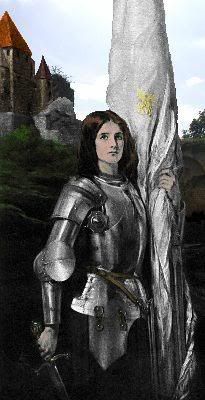
Jeanne d'Arc, the Maiden of Lorraine
The Maiden of Lorraine

Jeanne d'Arc, the Maiden of Lorraine
Dauphiné province of Berri
March, Year of our Lord Fourteen Twenty-six
‘She has sent one more of these letters, my lord. This girl who calls herself The Maiden of Lorraine.’
‘I can read by myself, thank you very much, Jacques.’
‘She pretends she has been sent by God. Look, not even a signature. What messenger of God cannot write his own name? I advise you not to see her, my lord.’
‘It says here that she is already on her way. She will be here any week now.’
‘This is preposterous. We know nothing about her. For all we know she could be a spy for the English.’
‘My lord, Jacques is right. She says she can hear voice in her head. She may be a sorceress. A witch.’
‘O Gérard, you judge her too hard. She is but a peasant who cares for her king, and wants to see me crowned. All she wants to do is to fight for me.’
‘Not exactly, my lord. She says here that she wants an army fully equipped at your expense. Considering we have lost all ports to the English in the last war, I have a hard time seeing how you can afford such a thing.’
‘Jacques, I can meet with her if I want to. With half of France gone to the English, it’s not like I have anything to lose.’
‘Except the other half, my lord. I strongly urge you not to see her.’
‘Well, I think you should.’
The sudden comment threw all three of them off balance. They looked across the room to the place of origin the voice had come from.‘So, this is interesting. How is it that while my mother-in-law thinks one thing, my two loyal and trusted advisors think another?’
‘Because I care about you,’ the Dauphin’s mother-in-law answered matter-of-factly.
‘If she is this saviour of France as she claims, then you have nothing to lose. If she is not, then you can get rid of her just as any other poor fool you have thrown into the dungeon.’
‘But who will pay for this army that she requests? I have lost everything.’
‘I will. You will receive enough to recruit a basis. And the rest will follow, you will see. When they spot this maiden, they will follow her without any thought of worldly possessions such as money.’
‘How can you be so sure?’ Jacques asked with a doubtful face.
‘Because peasants are simple people. And simple people follow two things. Money, and their hearts. There is an interesting story circling the country. A prophecy actually. It can be heard in every village. It says, that when France is in dire need, like now when half is beset by the English, a virgin from Lorraine will come forth, to save France. And now, a girl, proclaiming to be a virgin, from Lorraine, has sought an audience with you, sought to gain command of an army that will drive the English out. If she is the one, then she has truly been sent by God.’
‘You think she may have been sent by God?’
‘Perhaps. It is not my place to judge that. It is up to you. If she is not what she claims to be, then you will expose her quickly. But, if she really is all that this prophecy says, then I think she can help you. And maybe…just maybe, she can put that crown on your head.’
Dauphiné province of Berri
May, Year of our Lord Fourteen Twenty-six
They rode down the road in a set pace. They were not in a hurry, but they were not lagging behind either. The sun stood high in the blue spring sky and the scarce trees around them were just about to blossom. Having ridden for days, their brown capes had turned grey from relentless dust that marked their way for miles in the dry ground. There were four of them. For their whole journey, they had been trying to ride invisibly through the French scenery, all the way from Lorraine through the hostile territory of Burgundy. It was not until now they were safe, having crossed the Dauphin’s border several hours ago. Continuing their ride to the west, they reached the Dauphin’s palace within nightfall. As one figure made itself across the palace grounds to the stairways, the other three halted by the stables instead, taking care of their horses.
‘She’s here now, my lord.’
It was Pierre, his most personal aide and servant who spoke.‘Alright,’ Charles answered, trying to calm himself.
He wanted to meet with her of course. But what if Jacques or Gérard were right? What if she really was an assassin, or a witch sent by the English to cast a spell on him? His courage sank at the prospect of it.‘My lord, I again urge you not to see this woman. It is a trap, I can feel it!’
‘I have taken the precautions to consult a seer who told me that the stars says I have nothing to worry about,’ he answered, more to reassure himself than anybody else.
‘And suppose she is an assassin. What difference does a bunch of stars do then?’
‘Jacques, why do you say such things? I am the poorest man in the country. Especially after the English defeated my army. I have renounced the crown of France. Who would want to assassinate me?’
It took but one look by Jacques on the Dauphin’s closest so-called allies and dukes to make him understand.‘Right, they might. Then what should I do?’
‘Sire,’ Pierre suddenly said with a hushed voice. ‘What if you placed another on the throne before she arrived.’
It did not take the Dauphin long to figure out his servant’s plan and he became remarkably excited.‘Excellent. If she is truly sent by God, then she will discover the fake. If she is not, then she will kill the wrong man. The only question that remains is who.’
‘Sire, it would give me great pleasure to serve as the fake king. If I die, I will do so knowing that I have saved your life, for there is nothing more honourable than that.’
‘Then so be it. Listen up everybody.’ Charles stood up and waved to get the attention in the room. ‘We are going to play a little game with this maiden from Lorraine. Let us pretend, just pretend, that for now, I am not king. Instead, my valiant servant Pierre is. When the girl enters, nobody must give any hint whatsoever as to who I am.’
She headed upstairs, through the labyrinth of corridors that headed to the Dauphin’s reception chambers. She had never been there, yet she knew exactly how she was going to find the right room. They had told her. They had told her everything. The English plans for attacking, the betrayal of the Burgundese, and the fall of English France. They had given her a Godly sword. That and the robes she now wore were the only possessions she owned, except for her clothes.
She reached the door she had seen in her dreams. Her hand moved as if she did not control it, slowly opening it. She had expected to be received alone, just the Dauphin and her, with a few aides. This scene that was playing out in front of her was none of that.
The whole court was gathered, roaming around. People everywhere, not empty as she had foreseen. It made her nervous, her stomach acting up strangely. Forward, a voice told her. She did not know where it came from, or how it entered her mind. All she knew was that it had helped her numerous times before and had never lied to her. She strode inside the room, trying to search for the Dauphin. Suddenly a man stood in front of her.
‘I have come to see the Dauphin,’ she said with her strongest and most confident voice she was able to procure.
‘If you say so. This way,’ the man answered, leading through the mass of nobles and servants to one end of the room.
On a large wooden chair, wrapped in a white and red cape, embroidered with gold, sat a man, trying to look dignified. But as she headed his way, she began to stumble to the left, across the room. She withdrew further and further away from the throne, to a more remote area, not as well lit as the rest. Her path was irregular like that of a drunk though with a goal, but her steps were yet as strong as ever. She knew she was guided.‘You,’ she said, as she pointed with an arm she did not raise herself. ‘You are the Dauphin.’
The man in front of her stared at her with a chocked expression.‘How did you know?’
‘God guided my way, just as he has guided my fate.’
‘This is absurd! How can you claim to be sent by God just by pointing the Dauphin out. You could have seen him somewhere,’ Jacques spat out at her, having moved himself to the scene.
‘My dear Jacques,’ the Dauphin began, but was interrupted by his aide.
‘No! I say this woman must prove her link to God by doing something more than just locating Your Majesty!’
‘Dear God. I, Charles de Valois, pray to you now. I beg of You to remove all of my sin, for I have not prayed to Thee for a long time. I know it is wrong to hate, but I cannot stop hating. It is a feeling that cannot go away. I want to forgive, but I cannot forgive. The English has taken everything from me, and I want them to burn in the fires of Purgatory. They make me suffer by killing, plundering, and ravaging my lands. Why do You, in all Your glory, allow these things to happen? Is it a test for me? If so, it is a difficult and challenging one. In all Your glory, I pray that I will be liberated of them soon, and that Your fiery revenge shall strike down upon them and deliver them from these lands. Amen.’
The Dauphin could not believe what he heard with his own ears.‘That…that was my prayer, long ago, several months ago. How could you possibly know of it?’
‘It is the will of God,’ she simply replied.
‘You will make a deal with the Burgundians. In order for you not to break on your vow, Burgundy shall be the springing factor. You will join the war in secret and hope for the English not to see your involvement until it is too late. Therefore, time is everything. Once Burgundy strikes, you must have already mobilised your forces. Once we are at war, England will head for the Lorie valley and try to take Orleans. You must give me an army to lead the defence of that city, else it will fall.’
They were standing alone, in one of the many barracks the castle provided. Gathered around a map of France, only the Dauphin, Jeanne d'Arc as she called herself, and Charles's generals attended.‘Have you had any military training Jeanne, your name was Jeanne, right?’
‘No I have not, and yes it is.’
‘Well then, Jeanne, what makes you think that this here Dauphin will grant you an army at his expense to a commander who has had no military education, and if you pardon me to say this, a woman?’
‘What difference does it make if I am a woman, educated in war or not? It is God’s will and that is all that is important! You must let me lead this army, else all is lost for France.’
‘Did you not hear me, woman? There is no way that-‘
‘Enough, Philip, I have been convinced,’ Charles interrupted. ‘You shall receive all that is necessary. Leave the arrangements to me. Just tell me what I need to hear. When and where will the English and the Burgundians battle?’
‘The English will not bother with the Burgundians at first, not realising the threat. Once they move against them, battle can commence anywhere. What is important is not them. It is the defence of Orleans. Once the English spy our activities, as they will, they will take Orleans, and I must be there to stop them.’
‘Right. Then you make yourself comfortable here at the castle until everything has been prepared.’
Jeanne made her way out of the room.‘Jacques. Stay for a while, will you?’
‘Certainly, my lord.’
‘I need to write a letter.’
Jacques took up quill and feather-pen.‘For whom shall it be addressed to, my lord?’
‘To the English regent of France, the Duke of Bedford.’
Last edited:


